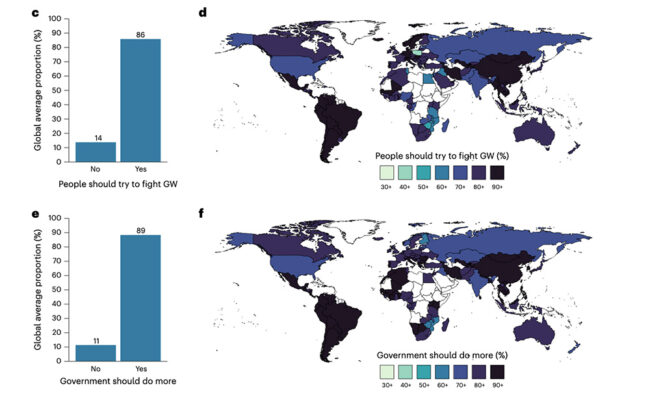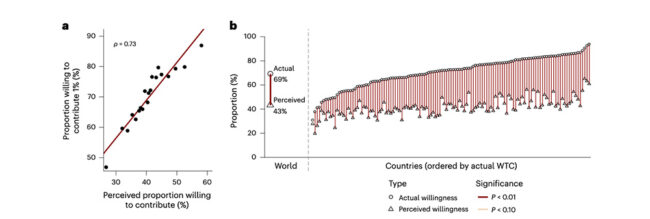How can most people support serious action on climate change and yet continue to believe we are in the minority? The answer: pluralistic ignorance.
Here’s a conundrum for you. Most people around the world support major government action to tackle climate change, and yet most of us believe that we’re in the minority.
This has been confirmed in several academic studies over the years, e.g. this one, this one or this one in the US, and it was recently supported by a major study of 130,000 people all around the world published in Nature.
First, here are some maps showing the huge percentages of people who say both that governments should do more to fight global warming and that people themselves should do more. A majority of people across the world also said that they were willing to contribute their own money to the struggle.

But the interesting thing is that in every single country, people wrongly estimated that only a minority of people would agree with them. This next chart is not so easy to follow, but if you look at the graph on the right, the circles on the top indicate the actual willingness of people in each country to contribute 1% of their income to fighting global warming. Then the triangles on the bottom indicate their perception of how many other people in their country would be willing to contribute. In every single country, there’s a large gap between perception and reality.

The psychological phenomenon at play here is known as pluralistic ignorance. What this means is that people wrongly believe that others think differently, and as a result they tend to be reticent about speaking out for fear of looking stupid. It’s been documented in many different areas throughout history, from racial prejudice to alcohol consumption, and it’s pretty much what happened in the famous tale of the Emperor’s New Clothes.
So why the widespread misperception? The Nature paper’s authors say:
The reasons underlying this perception gap are probably
multifaceted, encompassing factors such as media and public debates
disproportionately emphasizing climate-sceptical minority opinions,
and the influence of interest groups’ campaigning efforts. Moreover,
during periods of transition, individuals may erroneously attribute the
inadequate progress in addressing climate change to a persistent lack
of individual support for climate-friendly actions.
I don’t know about you, but I find this research quite encouraging. I was very surprised by the consistently high levels of support for serious action on climate change I saw in these studies, which shows that I have been living in a state of pluralistic ignorance myself.
It gives me hope to know that most people do support stronger government measures to tackle climate change, as well as more individual action, and people are willing to sacrifice a small amount of personal income to achieve those aims.
Significantly, one of those US studies I linked to earlier was focused on Republican voters, a group I would have expected to be more resistant to both climate change mitigation and the whole concept of government intervention. Yet even there, the same pattern held true: the majority supported stronger climate change action but believed that this was only a minority view.
Yes, most Republicans in the study said they supported things like tougher restrictions on power plants, more wind and solar power, and tax credits for carbon capture, but they believed only a minority of Republicans would also support them.
As a result, the authors say, “they may be discouraged from expressing their support due to an information environment disproportionately portraying Republicans as opposed to climate change action.”
So most people in the world want action to tackle climate change, even those who are generally portrayed as being opposed to it. That’s the good news. What we need to do now is break out of the trap of pluralistic ignorance. I think we need to do two things:
- Spread the news! Make more people aware that we are in the majority. This will build stronger support for action as people become less inhibited about speaking out.
- Focus on calling out the “information environment” and “interest groups” mentioned in the studies. We can shed this cautious academic language, of course, and call it what it is: the fossil fuel industry and those in their pay. A small minority is holding back progress and putting many lives at risk for the sake of profits for one industry. Name and shame the think tanks, pundits and politicians who take money from a dying industry and work to prop it up at the expense of our children’s futures.
It won’t be easy, of course. We’re talking about hugely powerful groups of people. But we can do it, step by step, conversation by conversation, article by article, book by book. The first step is to recognise and break out of our own pluralistic ignorance.



